Holistic Medicine: Concept Analysis for Patient Wellbeing and Delirium
VerifiedAdded on 2021/11/05
|12
|3498
|31
Essay
AI Summary
This essay provides a comprehensive concept analysis of holistic medicine, crucial in nursing and patient care, especially for patients experiencing delirium. It defines holism as encompassing the mind, body, and spirit, emphasizing the importance of addressing all aspects of a patient's well-being. The analysis explores key attributes such as mind, spirit, balance, and wholeness, along with antecedents like knowledge, relationship, and intention. The essay also examines the consequences of holistic care, including peace, healing, and a state of Zen. Through case studies, the analysis illustrates how nurses can apply holistic approaches to improve patient outcomes, particularly in managing delirium. By understanding the interrelationship of these elements, healthcare professionals can provide more effective, patient-centered care. The document emphasizes the need for nurses to focus on the interrelationship of body, spirit, and body, focusing on the patient's specific needs.
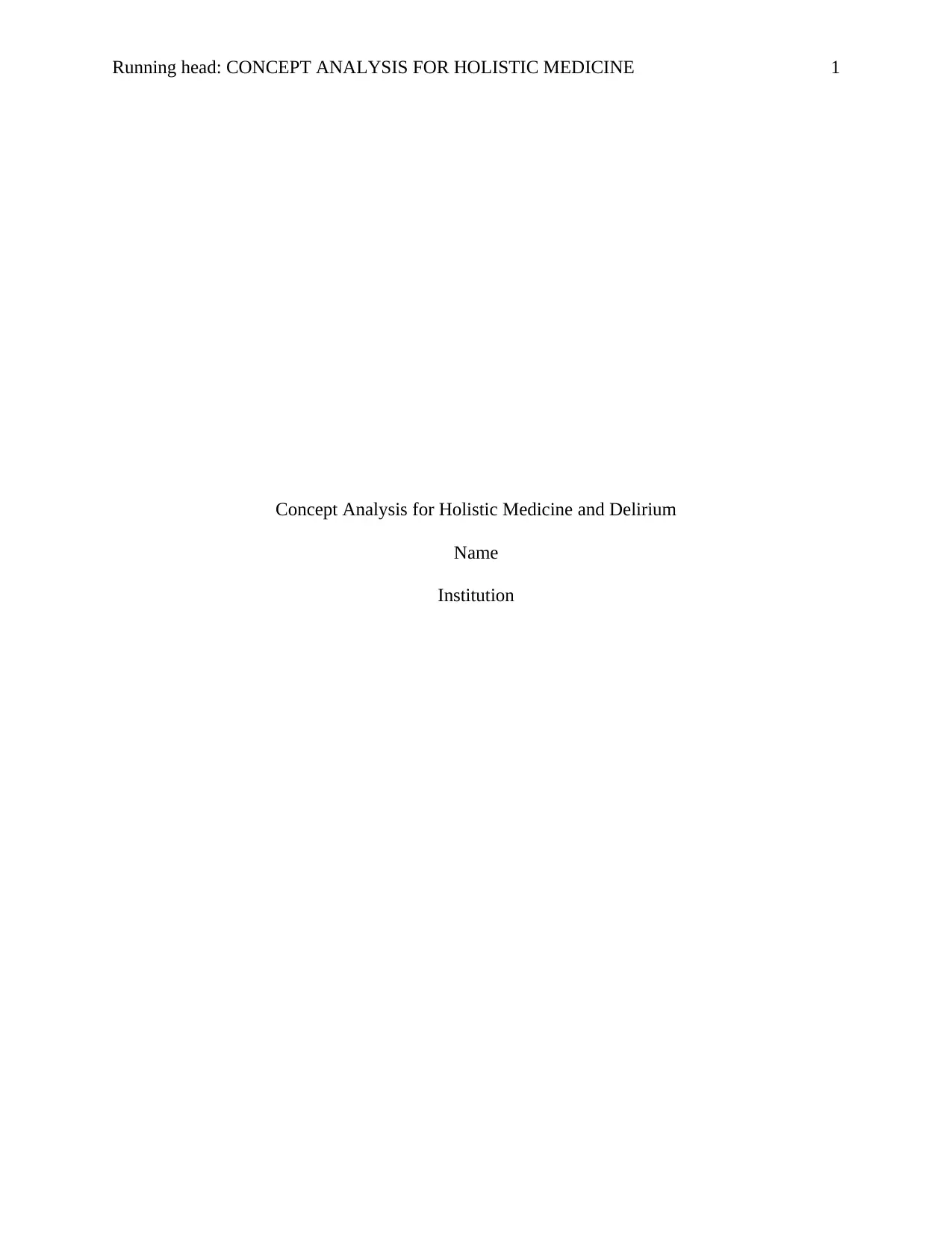
Running head: CONCEPT ANALYSIS FOR HOLISTIC MEDICINE 1
Concept Analysis for Holistic Medicine and Delirium
Name
Institution
Concept Analysis for Holistic Medicine and Delirium
Name
Institution
Paraphrase This Document
Need a fresh take? Get an instant paraphrase of this document with our AI Paraphraser
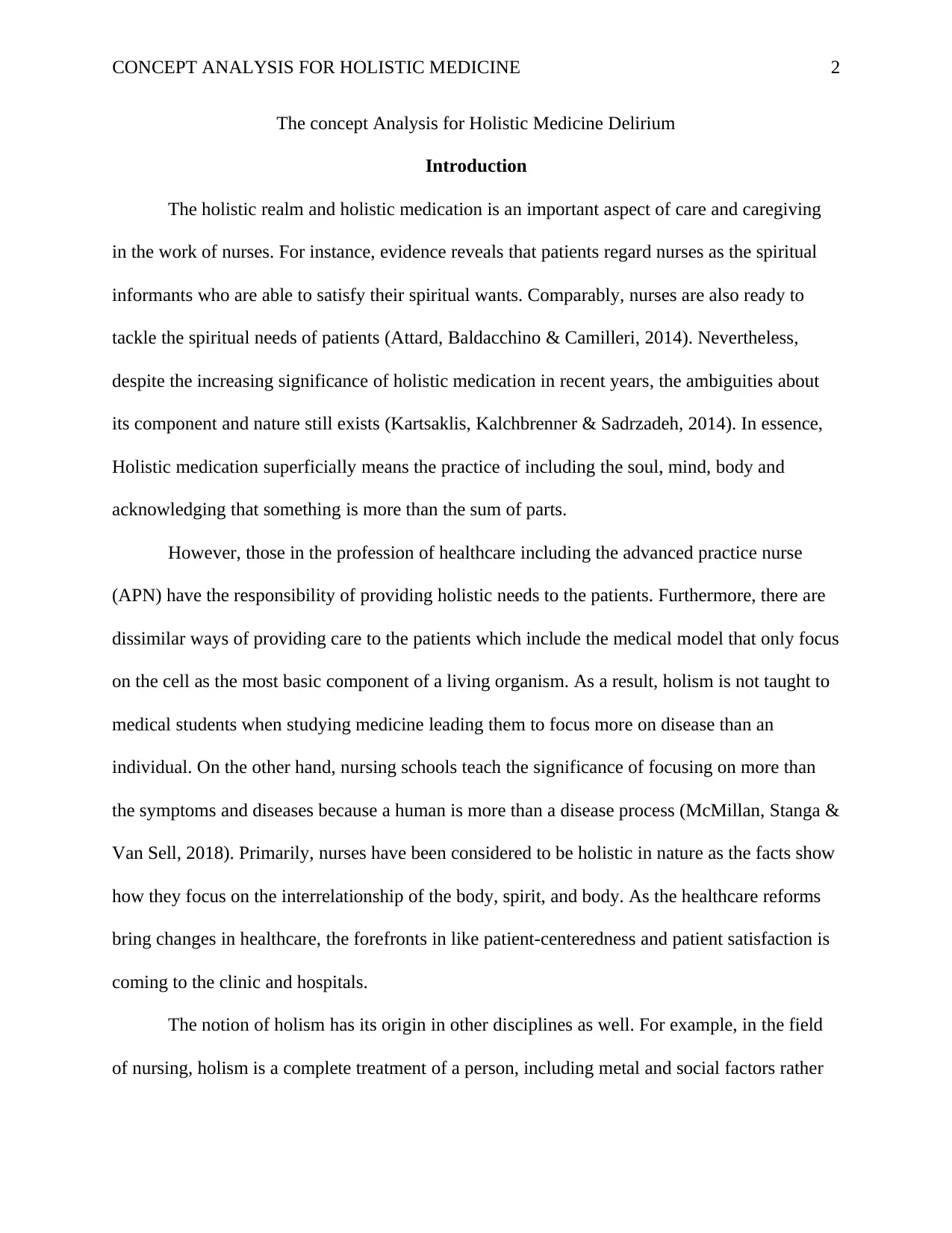
CONCEPT ANALYSIS FOR HOLISTIC MEDICINE 2
The concept Analysis for Holistic Medicine Delirium
Introduction
The holistic realm and holistic medication is an important aspect of care and caregiving
in the work of nurses. For instance, evidence reveals that patients regard nurses as the spiritual
informants who are able to satisfy their spiritual wants. Comparably, nurses are also ready to
tackle the spiritual needs of patients (Attard, Baldacchino & Camilleri, 2014). Nevertheless,
despite the increasing significance of holistic medication in recent years, the ambiguities about
its component and nature still exists (Kartsaklis, Kalchbrenner & Sadrzadeh, 2014). In essence,
Holistic medication superficially means the practice of including the soul, mind, body and
acknowledging that something is more than the sum of parts.
However, those in the profession of healthcare including the advanced practice nurse
(APN) have the responsibility of providing holistic needs to the patients. Furthermore, there are
dissimilar ways of providing care to the patients which include the medical model that only focus
on the cell as the most basic component of a living organism. As a result, holism is not taught to
medical students when studying medicine leading them to focus more on disease than an
individual. On the other hand, nursing schools teach the significance of focusing on more than
the symptoms and diseases because a human is more than a disease process (McMillan, Stanga &
Van Sell, 2018). Primarily, nurses have been considered to be holistic in nature as the facts show
how they focus on the interrelationship of the body, spirit, and body. As the healthcare reforms
bring changes in healthcare, the forefronts in like patient-centeredness and patient satisfaction is
coming to the clinic and hospitals.
The notion of holism has its origin in other disciplines as well. For example, in the field
of nursing, holism is a complete treatment of a person, including metal and social factors rather
The concept Analysis for Holistic Medicine Delirium
Introduction
The holistic realm and holistic medication is an important aspect of care and caregiving
in the work of nurses. For instance, evidence reveals that patients regard nurses as the spiritual
informants who are able to satisfy their spiritual wants. Comparably, nurses are also ready to
tackle the spiritual needs of patients (Attard, Baldacchino & Camilleri, 2014). Nevertheless,
despite the increasing significance of holistic medication in recent years, the ambiguities about
its component and nature still exists (Kartsaklis, Kalchbrenner & Sadrzadeh, 2014). In essence,
Holistic medication superficially means the practice of including the soul, mind, body and
acknowledging that something is more than the sum of parts.
However, those in the profession of healthcare including the advanced practice nurse
(APN) have the responsibility of providing holistic needs to the patients. Furthermore, there are
dissimilar ways of providing care to the patients which include the medical model that only focus
on the cell as the most basic component of a living organism. As a result, holism is not taught to
medical students when studying medicine leading them to focus more on disease than an
individual. On the other hand, nursing schools teach the significance of focusing on more than
the symptoms and diseases because a human is more than a disease process (McMillan, Stanga &
Van Sell, 2018). Primarily, nurses have been considered to be holistic in nature as the facts show
how they focus on the interrelationship of the body, spirit, and body. As the healthcare reforms
bring changes in healthcare, the forefronts in like patient-centeredness and patient satisfaction is
coming to the clinic and hospitals.
The notion of holism has its origin in other disciplines as well. For example, in the field
of nursing, holism is a complete treatment of a person, including metal and social factors rather
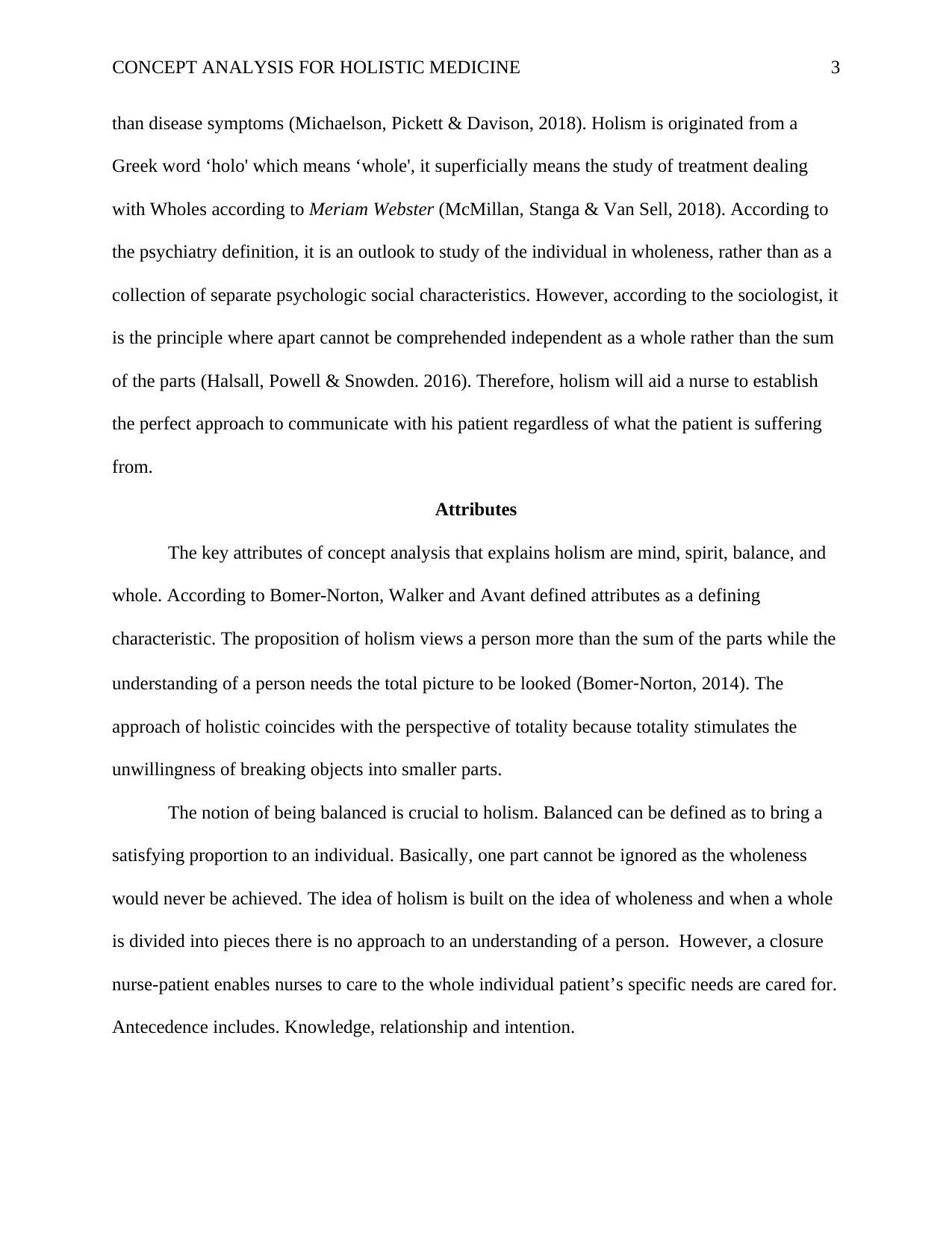
CONCEPT ANALYSIS FOR HOLISTIC MEDICINE 3
than disease symptoms (Michaelson, Pickett & Davison, 2018). Holism is originated from a
Greek word ‘holo' which means ‘whole', it superficially means the study of treatment dealing
with Wholes according to Meriam Webster (McMillan, Stanga & Van Sell, 2018). According to
the psychiatry definition, it is an outlook to study of the individual in wholeness, rather than as a
collection of separate psychologic social characteristics. However, according to the sociologist, it
is the principle where apart cannot be comprehended independent as a whole rather than the sum
of the parts (Halsall, Powell & Snowden. 2016). Therefore, holism will aid a nurse to establish
the perfect approach to communicate with his patient regardless of what the patient is suffering
from.
Attributes
The key attributes of concept analysis that explains holism are mind, spirit, balance, and
whole. According to Bomer-Norton, Walker and Avant defined attributes as a defining
characteristic. The proposition of holism views a person more than the sum of the parts while the
understanding of a person needs the total picture to be looked (Bomer‐Norton, 2014). The
approach of holistic coincides with the perspective of totality because totality stimulates the
unwillingness of breaking objects into smaller parts.
The notion of being balanced is crucial to holism. Balanced can be defined as to bring a
satisfying proportion to an individual. Basically, one part cannot be ignored as the wholeness
would never be achieved. The idea of holism is built on the idea of wholeness and when a whole
is divided into pieces there is no approach to an understanding of a person. However, a closure
nurse-patient enables nurses to care to the whole individual patient’s specific needs are cared for.
Antecedence includes. Knowledge, relationship and intention.
than disease symptoms (Michaelson, Pickett & Davison, 2018). Holism is originated from a
Greek word ‘holo' which means ‘whole', it superficially means the study of treatment dealing
with Wholes according to Meriam Webster (McMillan, Stanga & Van Sell, 2018). According to
the psychiatry definition, it is an outlook to study of the individual in wholeness, rather than as a
collection of separate psychologic social characteristics. However, according to the sociologist, it
is the principle where apart cannot be comprehended independent as a whole rather than the sum
of the parts (Halsall, Powell & Snowden. 2016). Therefore, holism will aid a nurse to establish
the perfect approach to communicate with his patient regardless of what the patient is suffering
from.
Attributes
The key attributes of concept analysis that explains holism are mind, spirit, balance, and
whole. According to Bomer-Norton, Walker and Avant defined attributes as a defining
characteristic. The proposition of holism views a person more than the sum of the parts while the
understanding of a person needs the total picture to be looked (Bomer‐Norton, 2014). The
approach of holistic coincides with the perspective of totality because totality stimulates the
unwillingness of breaking objects into smaller parts.
The notion of being balanced is crucial to holism. Balanced can be defined as to bring a
satisfying proportion to an individual. Basically, one part cannot be ignored as the wholeness
would never be achieved. The idea of holism is built on the idea of wholeness and when a whole
is divided into pieces there is no approach to an understanding of a person. However, a closure
nurse-patient enables nurses to care to the whole individual patient’s specific needs are cared for.
Antecedence includes. Knowledge, relationship and intention.
⊘ This is a preview!⊘
Do you want full access?
Subscribe today to unlock all pages.

Trusted by 1+ million students worldwide
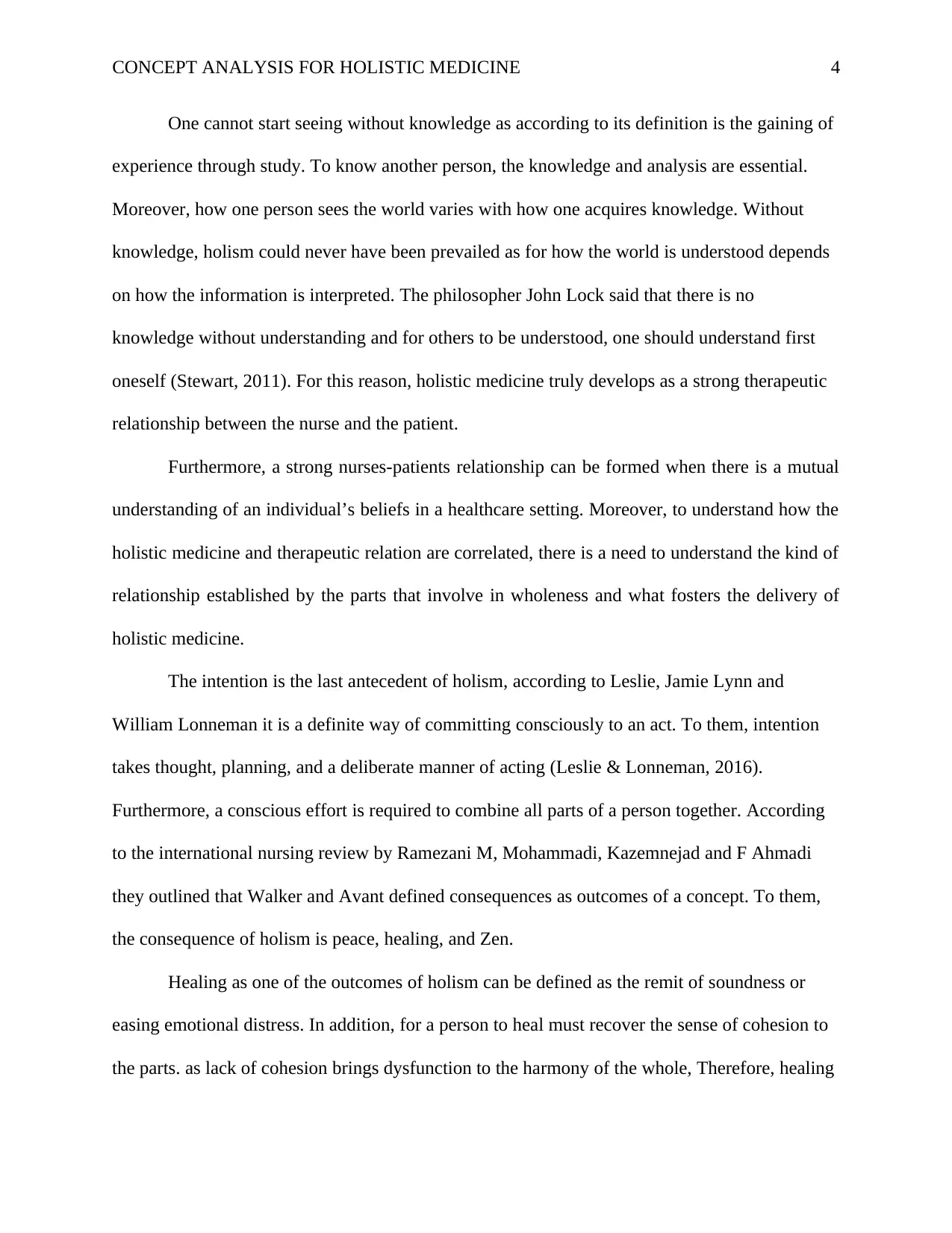
CONCEPT ANALYSIS FOR HOLISTIC MEDICINE 4
One cannot start seeing without knowledge as according to its definition is the gaining of
experience through study. To know another person, the knowledge and analysis are essential.
Moreover, how one person sees the world varies with how one acquires knowledge. Without
knowledge, holism could never have been prevailed as for how the world is understood depends
on how the information is interpreted. The philosopher John Lock said that there is no
knowledge without understanding and for others to be understood, one should understand first
oneself (Stewart, 2011). For this reason, holistic medicine truly develops as a strong therapeutic
relationship between the nurse and the patient.
Furthermore, a strong nurses-patients relationship can be formed when there is a mutual
understanding of an individual’s beliefs in a healthcare setting. Moreover, to understand how the
holistic medicine and therapeutic relation are correlated, there is a need to understand the kind of
relationship established by the parts that involve in wholeness and what fosters the delivery of
holistic medicine.
The intention is the last antecedent of holism, according to Leslie, Jamie Lynn and
William Lonneman it is a definite way of committing consciously to an act. To them, intention
takes thought, planning, and a deliberate manner of acting (Leslie & Lonneman, 2016).
Furthermore, a conscious effort is required to combine all parts of a person together. According
to the international nursing review by Ramezani M, Mohammadi, Kazemnejad and F Ahmadi
they outlined that Walker and Avant defined consequences as outcomes of a concept. To them,
the consequence of holism is peace, healing, and Zen.
Healing as one of the outcomes of holism can be defined as the remit of soundness or
easing emotional distress. In addition, for a person to heal must recover the sense of cohesion to
the parts. as lack of cohesion brings dysfunction to the harmony of the whole, Therefore, healing
One cannot start seeing without knowledge as according to its definition is the gaining of
experience through study. To know another person, the knowledge and analysis are essential.
Moreover, how one person sees the world varies with how one acquires knowledge. Without
knowledge, holism could never have been prevailed as for how the world is understood depends
on how the information is interpreted. The philosopher John Lock said that there is no
knowledge without understanding and for others to be understood, one should understand first
oneself (Stewart, 2011). For this reason, holistic medicine truly develops as a strong therapeutic
relationship between the nurse and the patient.
Furthermore, a strong nurses-patients relationship can be formed when there is a mutual
understanding of an individual’s beliefs in a healthcare setting. Moreover, to understand how the
holistic medicine and therapeutic relation are correlated, there is a need to understand the kind of
relationship established by the parts that involve in wholeness and what fosters the delivery of
holistic medicine.
The intention is the last antecedent of holism, according to Leslie, Jamie Lynn and
William Lonneman it is a definite way of committing consciously to an act. To them, intention
takes thought, planning, and a deliberate manner of acting (Leslie & Lonneman, 2016).
Furthermore, a conscious effort is required to combine all parts of a person together. According
to the international nursing review by Ramezani M, Mohammadi, Kazemnejad and F Ahmadi
they outlined that Walker and Avant defined consequences as outcomes of a concept. To them,
the consequence of holism is peace, healing, and Zen.
Healing as one of the outcomes of holism can be defined as the remit of soundness or
easing emotional distress. In addition, for a person to heal must recover the sense of cohesion to
the parts. as lack of cohesion brings dysfunction to the harmony of the whole, Therefore, healing
Paraphrase This Document
Need a fresh take? Get an instant paraphrase of this document with our AI Paraphraser
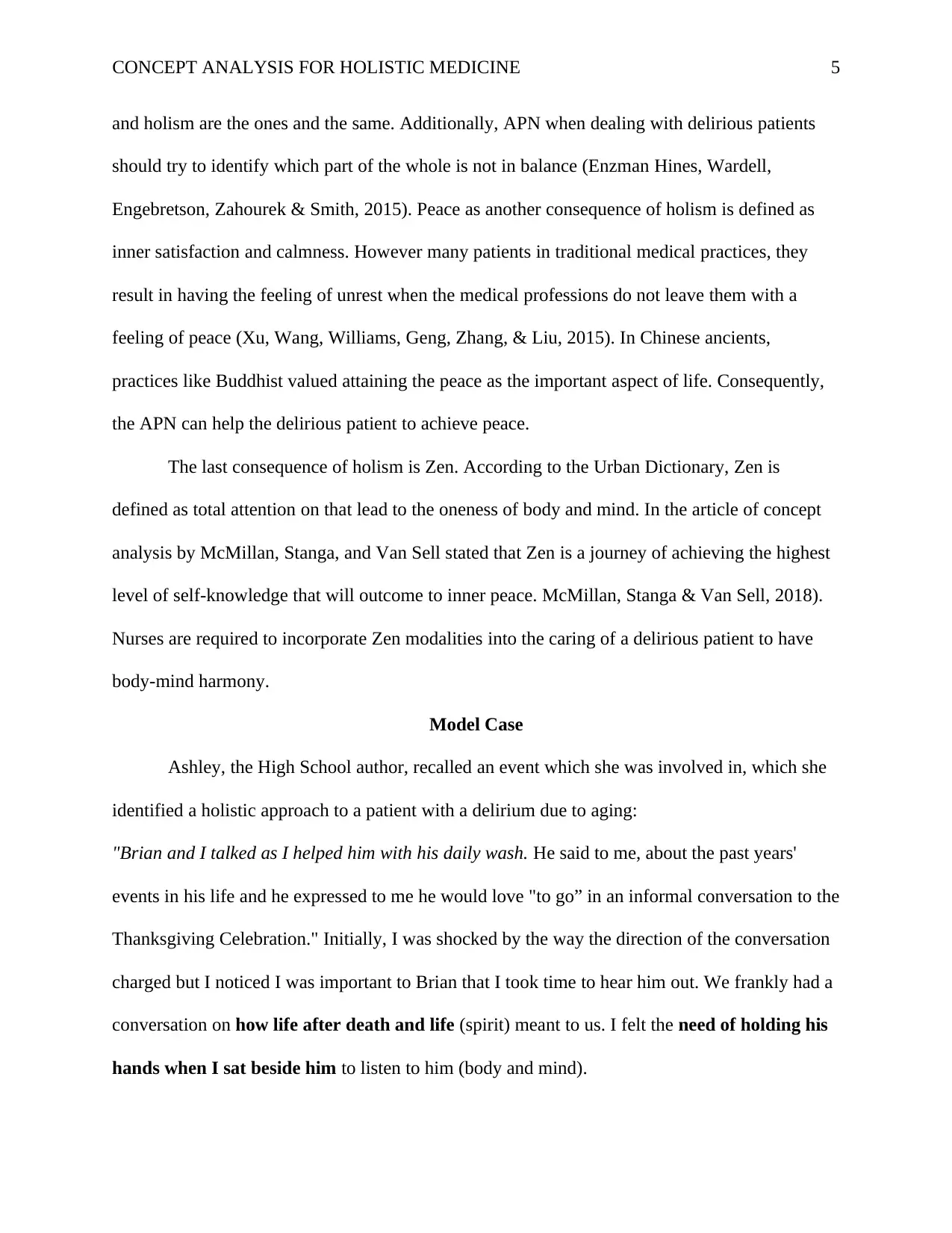
CONCEPT ANALYSIS FOR HOLISTIC MEDICINE 5
and holism are the ones and the same. Additionally, APN when dealing with delirious patients
should try to identify which part of the whole is not in balance (Enzman Hines, Wardell,
Engebretson, Zahourek & Smith, 2015). Peace as another consequence of holism is defined as
inner satisfaction and calmness. However many patients in traditional medical practices, they
result in having the feeling of unrest when the medical professions do not leave them with a
feeling of peace (Xu, Wang, Williams, Geng, Zhang, & Liu, 2015). In Chinese ancients,
practices like Buddhist valued attaining the peace as the important aspect of life. Consequently,
the APN can help the delirious patient to achieve peace.
The last consequence of holism is Zen. According to the Urban Dictionary, Zen is
defined as total attention on that lead to the oneness of body and mind. In the article of concept
analysis by McMillan, Stanga, and Van Sell stated that Zen is a journey of achieving the highest
level of self-knowledge that will outcome to inner peace. McMillan, Stanga & Van Sell, 2018).
Nurses are required to incorporate Zen modalities into the caring of a delirious patient to have
body-mind harmony.
Model Case
Ashley, the High School author, recalled an event which she was involved in, which she
identified a holistic approach to a patient with a delirium due to aging:
"Brian and I talked as I helped him with his daily wash. He said to me, about the past years'
events in his life and he expressed to me he would love "to go” in an informal conversation to the
Thanksgiving Celebration." Initially, I was shocked by the way the direction of the conversation
charged but I noticed I was important to Brian that I took time to hear him out. We frankly had a
conversation on how life after death and life (spirit) meant to us. I felt the need of holding his
hands when I sat beside him to listen to him (body and mind).
and holism are the ones and the same. Additionally, APN when dealing with delirious patients
should try to identify which part of the whole is not in balance (Enzman Hines, Wardell,
Engebretson, Zahourek & Smith, 2015). Peace as another consequence of holism is defined as
inner satisfaction and calmness. However many patients in traditional medical practices, they
result in having the feeling of unrest when the medical professions do not leave them with a
feeling of peace (Xu, Wang, Williams, Geng, Zhang, & Liu, 2015). In Chinese ancients,
practices like Buddhist valued attaining the peace as the important aspect of life. Consequently,
the APN can help the delirious patient to achieve peace.
The last consequence of holism is Zen. According to the Urban Dictionary, Zen is
defined as total attention on that lead to the oneness of body and mind. In the article of concept
analysis by McMillan, Stanga, and Van Sell stated that Zen is a journey of achieving the highest
level of self-knowledge that will outcome to inner peace. McMillan, Stanga & Van Sell, 2018).
Nurses are required to incorporate Zen modalities into the caring of a delirious patient to have
body-mind harmony.
Model Case
Ashley, the High School author, recalled an event which she was involved in, which she
identified a holistic approach to a patient with a delirium due to aging:
"Brian and I talked as I helped him with his daily wash. He said to me, about the past years'
events in his life and he expressed to me he would love "to go” in an informal conversation to the
Thanksgiving Celebration." Initially, I was shocked by the way the direction of the conversation
charged but I noticed I was important to Brian that I took time to hear him out. We frankly had a
conversation on how life after death and life (spirit) meant to us. I felt the need of holding his
hands when I sat beside him to listen to him (body and mind).
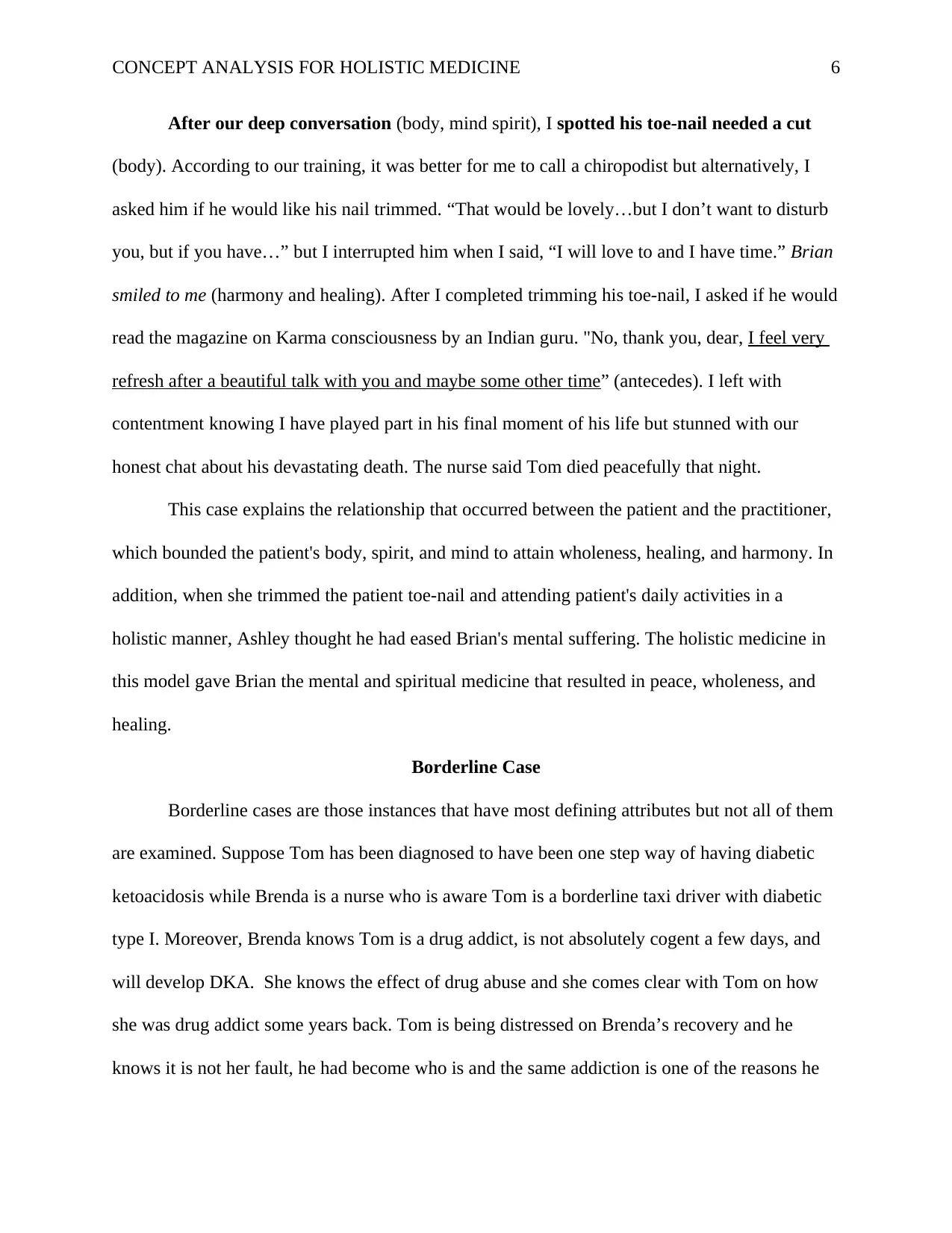
CONCEPT ANALYSIS FOR HOLISTIC MEDICINE 6
After our deep conversation (body, mind spirit), I spotted his toe-nail needed a cut
(body). According to our training, it was better for me to call a chiropodist but alternatively, I
asked him if he would like his nail trimmed. “That would be lovely…but I don’t want to disturb
you, but if you have…” but I interrupted him when I said, “I will love to and I have time.” Brian
smiled to me (harmony and healing). After I completed trimming his toe-nail, I asked if he would
read the magazine on Karma consciousness by an Indian guru. "No, thank you, dear, I feel very
refresh after a beautiful talk with you and maybe some other time” (antecedes). I left with
contentment knowing I have played part in his final moment of his life but stunned with our
honest chat about his devastating death. The nurse said Tom died peacefully that night.
This case explains the relationship that occurred between the patient and the practitioner,
which bounded the patient's body, spirit, and mind to attain wholeness, healing, and harmony. In
addition, when she trimmed the patient toe-nail and attending patient's daily activities in a
holistic manner, Ashley thought he had eased Brian's mental suffering. The holistic medicine in
this model gave Brian the mental and spiritual medicine that resulted in peace, wholeness, and
healing.
Borderline Case
Borderline cases are those instances that have most defining attributes but not all of them
are examined. Suppose Tom has been diagnosed to have been one step way of having diabetic
ketoacidosis while Brenda is a nurse who is aware Tom is a borderline taxi driver with diabetic
type I. Moreover, Brenda knows Tom is a drug addict, is not absolutely cogent a few days, and
will develop DKA. She knows the effect of drug abuse and she comes clear with Tom on how
she was drug addict some years back. Tom is being distressed on Brenda’s recovery and he
knows it is not her fault, he had become who is and the same addiction is one of the reasons he
After our deep conversation (body, mind spirit), I spotted his toe-nail needed a cut
(body). According to our training, it was better for me to call a chiropodist but alternatively, I
asked him if he would like his nail trimmed. “That would be lovely…but I don’t want to disturb
you, but if you have…” but I interrupted him when I said, “I will love to and I have time.” Brian
smiled to me (harmony and healing). After I completed trimming his toe-nail, I asked if he would
read the magazine on Karma consciousness by an Indian guru. "No, thank you, dear, I feel very
refresh after a beautiful talk with you and maybe some other time” (antecedes). I left with
contentment knowing I have played part in his final moment of his life but stunned with our
honest chat about his devastating death. The nurse said Tom died peacefully that night.
This case explains the relationship that occurred between the patient and the practitioner,
which bounded the patient's body, spirit, and mind to attain wholeness, healing, and harmony. In
addition, when she trimmed the patient toe-nail and attending patient's daily activities in a
holistic manner, Ashley thought he had eased Brian's mental suffering. The holistic medicine in
this model gave Brian the mental and spiritual medicine that resulted in peace, wholeness, and
healing.
Borderline Case
Borderline cases are those instances that have most defining attributes but not all of them
are examined. Suppose Tom has been diagnosed to have been one step way of having diabetic
ketoacidosis while Brenda is a nurse who is aware Tom is a borderline taxi driver with diabetic
type I. Moreover, Brenda knows Tom is a drug addict, is not absolutely cogent a few days, and
will develop DKA. She knows the effect of drug abuse and she comes clear with Tom on how
she was drug addict some years back. Tom is being distressed on Brenda’s recovery and he
knows it is not her fault, he had become who is and the same addiction is one of the reasons he
⊘ This is a preview!⊘
Do you want full access?
Subscribe today to unlock all pages.

Trusted by 1+ million students worldwide
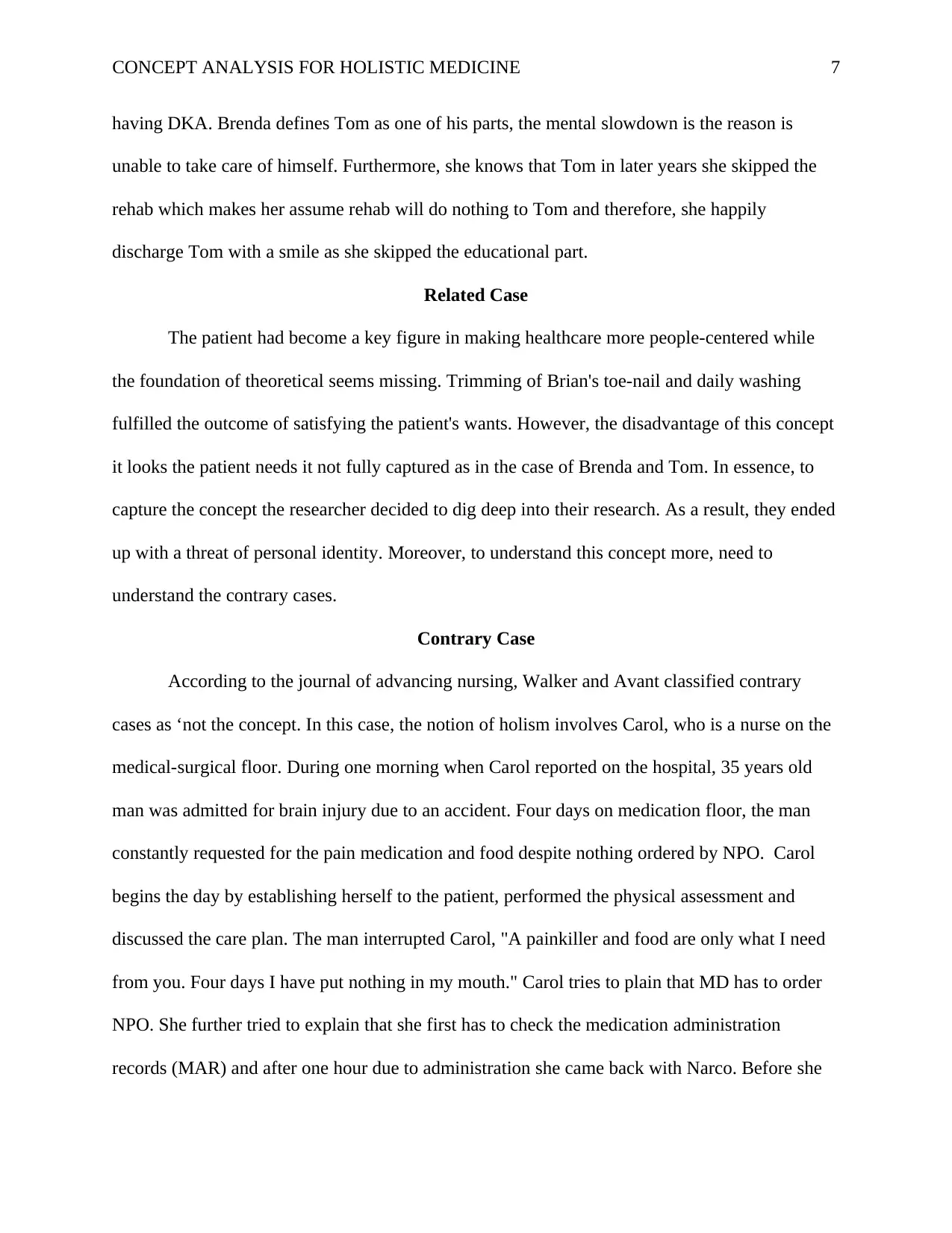
CONCEPT ANALYSIS FOR HOLISTIC MEDICINE 7
having DKA. Brenda defines Tom as one of his parts, the mental slowdown is the reason is
unable to take care of himself. Furthermore, she knows that Tom in later years she skipped the
rehab which makes her assume rehab will do nothing to Tom and therefore, she happily
discharge Tom with a smile as she skipped the educational part.
Related Case
The patient had become a key figure in making healthcare more people-centered while
the foundation of theoretical seems missing. Trimming of Brian's toe-nail and daily washing
fulfilled the outcome of satisfying the patient's wants. However, the disadvantage of this concept
it looks the patient needs it not fully captured as in the case of Brenda and Tom. In essence, to
capture the concept the researcher decided to dig deep into their research. As a result, they ended
up with a threat of personal identity. Moreover, to understand this concept more, need to
understand the contrary cases.
Contrary Case
According to the journal of advancing nursing, Walker and Avant classified contrary
cases as ‘not the concept. In this case, the notion of holism involves Carol, who is a nurse on the
medical-surgical floor. During one morning when Carol reported on the hospital, 35 years old
man was admitted for brain injury due to an accident. Four days on medication floor, the man
constantly requested for the pain medication and food despite nothing ordered by NPO. Carol
begins the day by establishing herself to the patient, performed the physical assessment and
discussed the care plan. The man interrupted Carol, "A painkiller and food are only what I need
from you. Four days I have put nothing in my mouth." Carol tries to plain that MD has to order
NPO. She further tried to explain that she first has to check the medication administration
records (MAR) and after one hour due to administration she came back with Narco. Before she
having DKA. Brenda defines Tom as one of his parts, the mental slowdown is the reason is
unable to take care of himself. Furthermore, she knows that Tom in later years she skipped the
rehab which makes her assume rehab will do nothing to Tom and therefore, she happily
discharge Tom with a smile as she skipped the educational part.
Related Case
The patient had become a key figure in making healthcare more people-centered while
the foundation of theoretical seems missing. Trimming of Brian's toe-nail and daily washing
fulfilled the outcome of satisfying the patient's wants. However, the disadvantage of this concept
it looks the patient needs it not fully captured as in the case of Brenda and Tom. In essence, to
capture the concept the researcher decided to dig deep into their research. As a result, they ended
up with a threat of personal identity. Moreover, to understand this concept more, need to
understand the contrary cases.
Contrary Case
According to the journal of advancing nursing, Walker and Avant classified contrary
cases as ‘not the concept. In this case, the notion of holism involves Carol, who is a nurse on the
medical-surgical floor. During one morning when Carol reported on the hospital, 35 years old
man was admitted for brain injury due to an accident. Four days on medication floor, the man
constantly requested for the pain medication and food despite nothing ordered by NPO. Carol
begins the day by establishing herself to the patient, performed the physical assessment and
discussed the care plan. The man interrupted Carol, "A painkiller and food are only what I need
from you. Four days I have put nothing in my mouth." Carol tries to plain that MD has to order
NPO. She further tried to explain that she first has to check the medication administration
records (MAR) and after one hour due to administration she came back with Narco. Before she
Paraphrase This Document
Need a fresh take? Get an instant paraphrase of this document with our AI Paraphraser
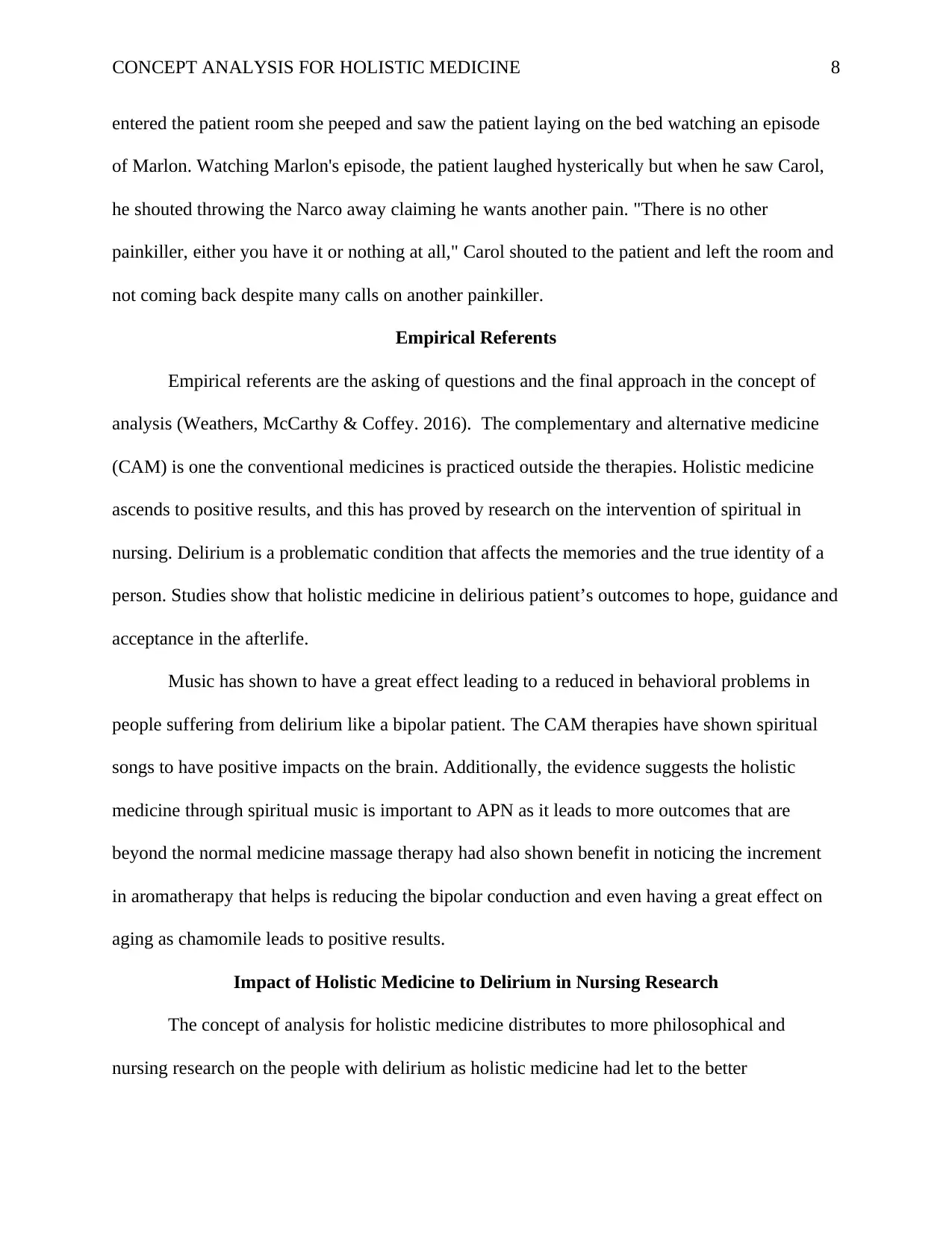
CONCEPT ANALYSIS FOR HOLISTIC MEDICINE 8
entered the patient room she peeped and saw the patient laying on the bed watching an episode
of Marlon. Watching Marlon's episode, the patient laughed hysterically but when he saw Carol,
he shouted throwing the Narco away claiming he wants another pain. "There is no other
painkiller, either you have it or nothing at all," Carol shouted to the patient and left the room and
not coming back despite many calls on another painkiller.
Empirical Referents
Empirical referents are the asking of questions and the final approach in the concept of
analysis (Weathers, McCarthy & Coffey. 2016). The complementary and alternative medicine
(CAM) is one the conventional medicines is practiced outside the therapies. Holistic medicine
ascends to positive results, and this has proved by research on the intervention of spiritual in
nursing. Delirium is a problematic condition that affects the memories and the true identity of a
person. Studies show that holistic medicine in delirious patient’s outcomes to hope, guidance and
acceptance in the afterlife.
Music has shown to have a great effect leading to a reduced in behavioral problems in
people suffering from delirium like a bipolar patient. The CAM therapies have shown spiritual
songs to have positive impacts on the brain. Additionally, the evidence suggests the holistic
medicine through spiritual music is important to APN as it leads to more outcomes that are
beyond the normal medicine massage therapy had also shown benefit in noticing the increment
in aromatherapy that helps is reducing the bipolar conduction and even having a great effect on
aging as chamomile leads to positive results.
Impact of Holistic Medicine to Delirium in Nursing Research
The concept of analysis for holistic medicine distributes to more philosophical and
nursing research on the people with delirium as holistic medicine had let to the better
entered the patient room she peeped and saw the patient laying on the bed watching an episode
of Marlon. Watching Marlon's episode, the patient laughed hysterically but when he saw Carol,
he shouted throwing the Narco away claiming he wants another pain. "There is no other
painkiller, either you have it or nothing at all," Carol shouted to the patient and left the room and
not coming back despite many calls on another painkiller.
Empirical Referents
Empirical referents are the asking of questions and the final approach in the concept of
analysis (Weathers, McCarthy & Coffey. 2016). The complementary and alternative medicine
(CAM) is one the conventional medicines is practiced outside the therapies. Holistic medicine
ascends to positive results, and this has proved by research on the intervention of spiritual in
nursing. Delirium is a problematic condition that affects the memories and the true identity of a
person. Studies show that holistic medicine in delirious patient’s outcomes to hope, guidance and
acceptance in the afterlife.
Music has shown to have a great effect leading to a reduced in behavioral problems in
people suffering from delirium like a bipolar patient. The CAM therapies have shown spiritual
songs to have positive impacts on the brain. Additionally, the evidence suggests the holistic
medicine through spiritual music is important to APN as it leads to more outcomes that are
beyond the normal medicine massage therapy had also shown benefit in noticing the increment
in aromatherapy that helps is reducing the bipolar conduction and even having a great effect on
aging as chamomile leads to positive results.
Impact of Holistic Medicine to Delirium in Nursing Research
The concept of analysis for holistic medicine distributes to more philosophical and
nursing research on the people with delirium as holistic medicine had let to the better
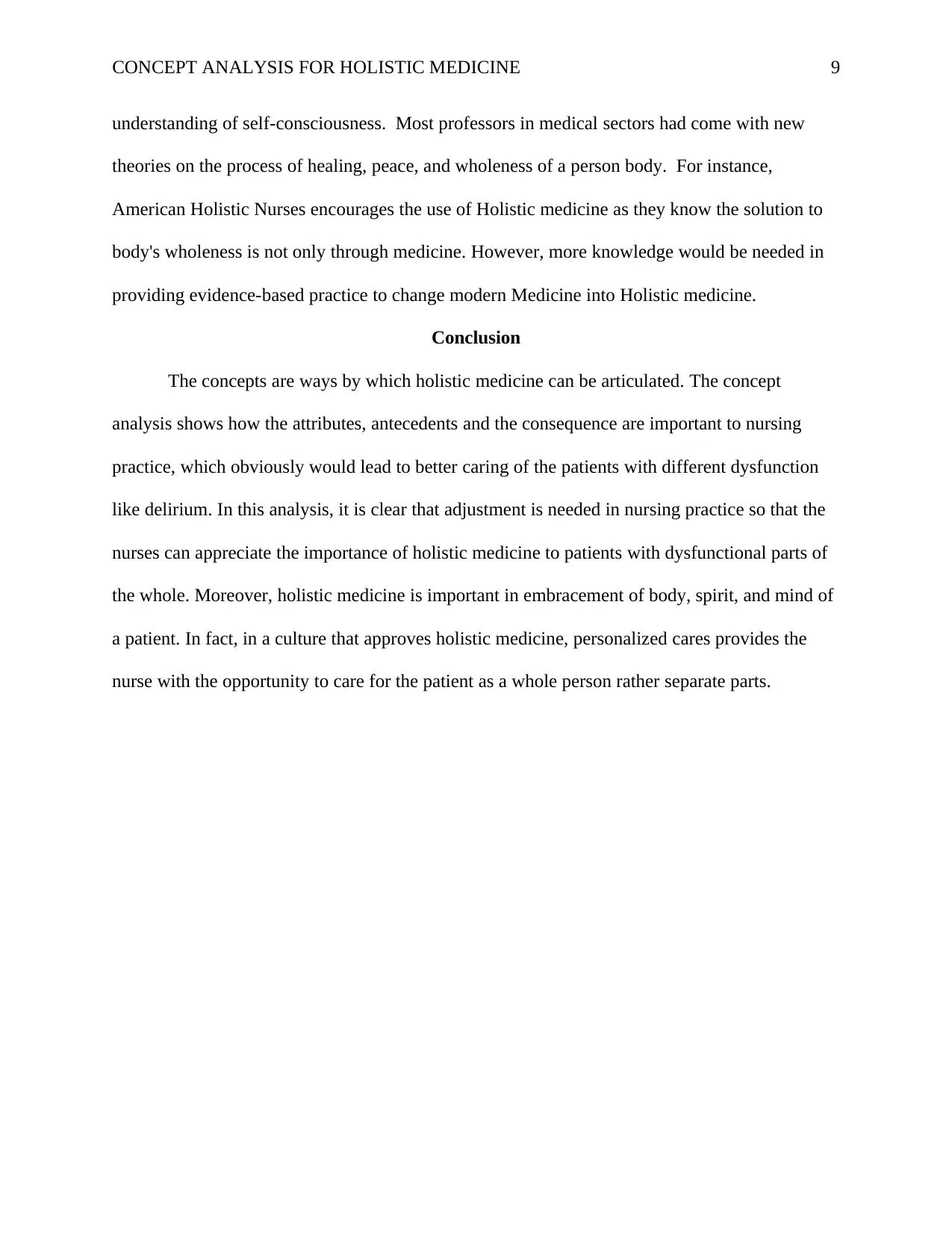
CONCEPT ANALYSIS FOR HOLISTIC MEDICINE 9
understanding of self-consciousness. Most professors in medical sectors had come with new
theories on the process of healing, peace, and wholeness of a person body. For instance,
American Holistic Nurses encourages the use of Holistic medicine as they know the solution to
body's wholeness is not only through medicine. However, more knowledge would be needed in
providing evidence-based practice to change modern Medicine into Holistic medicine.
Conclusion
The concepts are ways by which holistic medicine can be articulated. The concept
analysis shows how the attributes, antecedents and the consequence are important to nursing
practice, which obviously would lead to better caring of the patients with different dysfunction
like delirium. In this analysis, it is clear that adjustment is needed in nursing practice so that the
nurses can appreciate the importance of holistic medicine to patients with dysfunctional parts of
the whole. Moreover, holistic medicine is important in embracement of body, spirit, and mind of
a patient. In fact, in a culture that approves holistic medicine, personalized cares provides the
nurse with the opportunity to care for the patient as a whole person rather separate parts.
understanding of self-consciousness. Most professors in medical sectors had come with new
theories on the process of healing, peace, and wholeness of a person body. For instance,
American Holistic Nurses encourages the use of Holistic medicine as they know the solution to
body's wholeness is not only through medicine. However, more knowledge would be needed in
providing evidence-based practice to change modern Medicine into Holistic medicine.
Conclusion
The concepts are ways by which holistic medicine can be articulated. The concept
analysis shows how the attributes, antecedents and the consequence are important to nursing
practice, which obviously would lead to better caring of the patients with different dysfunction
like delirium. In this analysis, it is clear that adjustment is needed in nursing practice so that the
nurses can appreciate the importance of holistic medicine to patients with dysfunctional parts of
the whole. Moreover, holistic medicine is important in embracement of body, spirit, and mind of
a patient. In fact, in a culture that approves holistic medicine, personalized cares provides the
nurse with the opportunity to care for the patient as a whole person rather separate parts.
⊘ This is a preview!⊘
Do you want full access?
Subscribe today to unlock all pages.

Trusted by 1+ million students worldwide
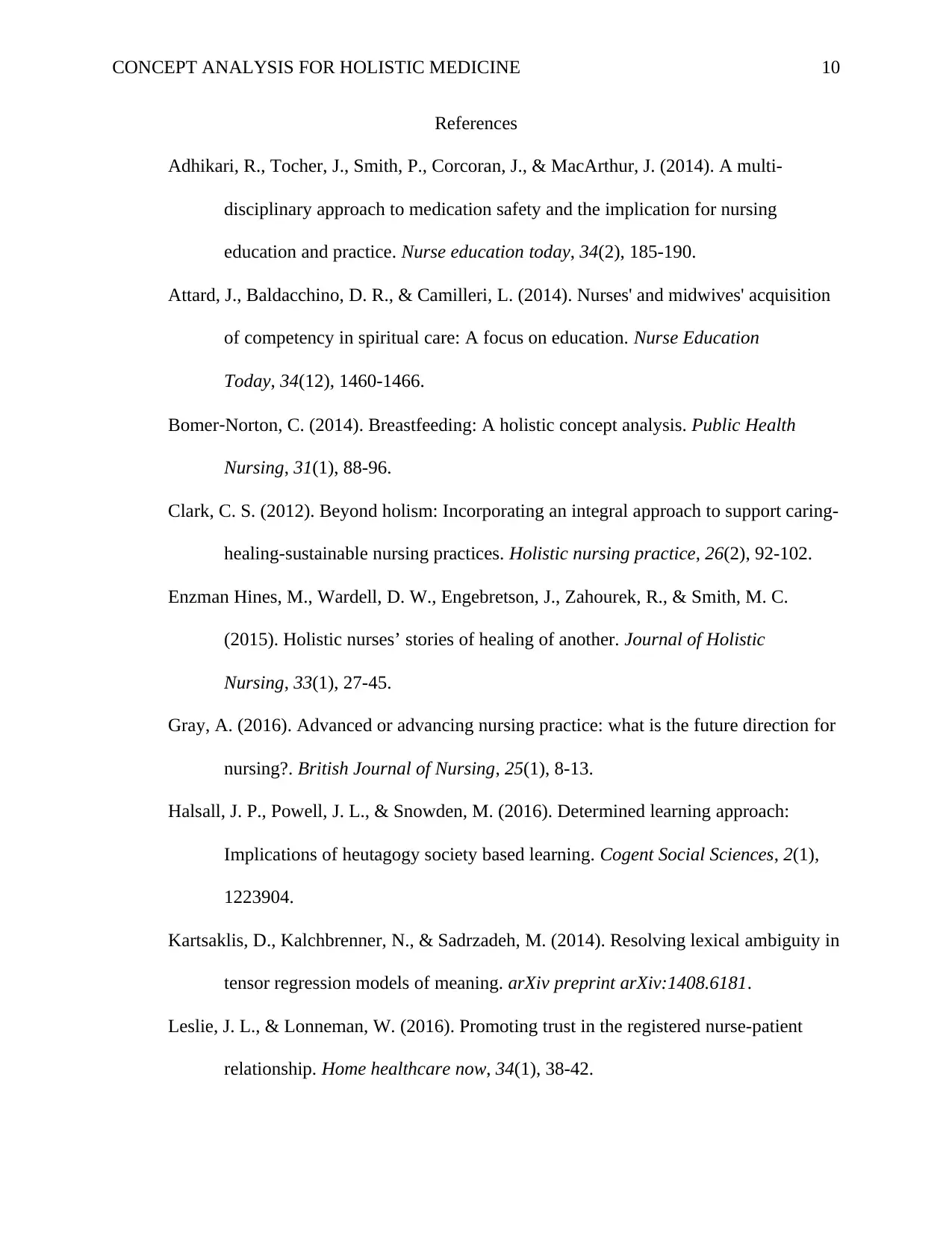
CONCEPT ANALYSIS FOR HOLISTIC MEDICINE 10
References
Adhikari, R., Tocher, J., Smith, P., Corcoran, J., & MacArthur, J. (2014). A multi-
disciplinary approach to medication safety and the implication for nursing
education and practice. Nurse education today, 34(2), 185-190.
Attard, J., Baldacchino, D. R., & Camilleri, L. (2014). Nurses' and midwives' acquisition
of competency in spiritual care: A focus on education. Nurse Education
Today, 34(12), 1460-1466.
Bomer‐Norton, C. (2014). Breastfeeding: A holistic concept analysis. Public Health
Nursing, 31(1), 88-96.
Clark, C. S. (2012). Beyond holism: Incorporating an integral approach to support caring-
healing-sustainable nursing practices. Holistic nursing practice, 26(2), 92-102.
Enzman Hines, M., Wardell, D. W., Engebretson, J., Zahourek, R., & Smith, M. C.
(2015). Holistic nurses’ stories of healing of another. Journal of Holistic
Nursing, 33(1), 27-45.
Gray, A. (2016). Advanced or advancing nursing practice: what is the future direction for
nursing?. British Journal of Nursing, 25(1), 8-13.
Halsall, J. P., Powell, J. L., & Snowden, M. (2016). Determined learning approach:
Implications of heutagogy society based learning. Cogent Social Sciences, 2(1),
1223904.
Kartsaklis, D., Kalchbrenner, N., & Sadrzadeh, M. (2014). Resolving lexical ambiguity in
tensor regression models of meaning. arXiv preprint arXiv:1408.6181.
Leslie, J. L., & Lonneman, W. (2016). Promoting trust in the registered nurse-patient
relationship. Home healthcare now, 34(1), 38-42.
References
Adhikari, R., Tocher, J., Smith, P., Corcoran, J., & MacArthur, J. (2014). A multi-
disciplinary approach to medication safety and the implication for nursing
education and practice. Nurse education today, 34(2), 185-190.
Attard, J., Baldacchino, D. R., & Camilleri, L. (2014). Nurses' and midwives' acquisition
of competency in spiritual care: A focus on education. Nurse Education
Today, 34(12), 1460-1466.
Bomer‐Norton, C. (2014). Breastfeeding: A holistic concept analysis. Public Health
Nursing, 31(1), 88-96.
Clark, C. S. (2012). Beyond holism: Incorporating an integral approach to support caring-
healing-sustainable nursing practices. Holistic nursing practice, 26(2), 92-102.
Enzman Hines, M., Wardell, D. W., Engebretson, J., Zahourek, R., & Smith, M. C.
(2015). Holistic nurses’ stories of healing of another. Journal of Holistic
Nursing, 33(1), 27-45.
Gray, A. (2016). Advanced or advancing nursing practice: what is the future direction for
nursing?. British Journal of Nursing, 25(1), 8-13.
Halsall, J. P., Powell, J. L., & Snowden, M. (2016). Determined learning approach:
Implications of heutagogy society based learning. Cogent Social Sciences, 2(1),
1223904.
Kartsaklis, D., Kalchbrenner, N., & Sadrzadeh, M. (2014). Resolving lexical ambiguity in
tensor regression models of meaning. arXiv preprint arXiv:1408.6181.
Leslie, J. L., & Lonneman, W. (2016). Promoting trust in the registered nurse-patient
relationship. Home healthcare now, 34(1), 38-42.
Paraphrase This Document
Need a fresh take? Get an instant paraphrase of this document with our AI Paraphraser
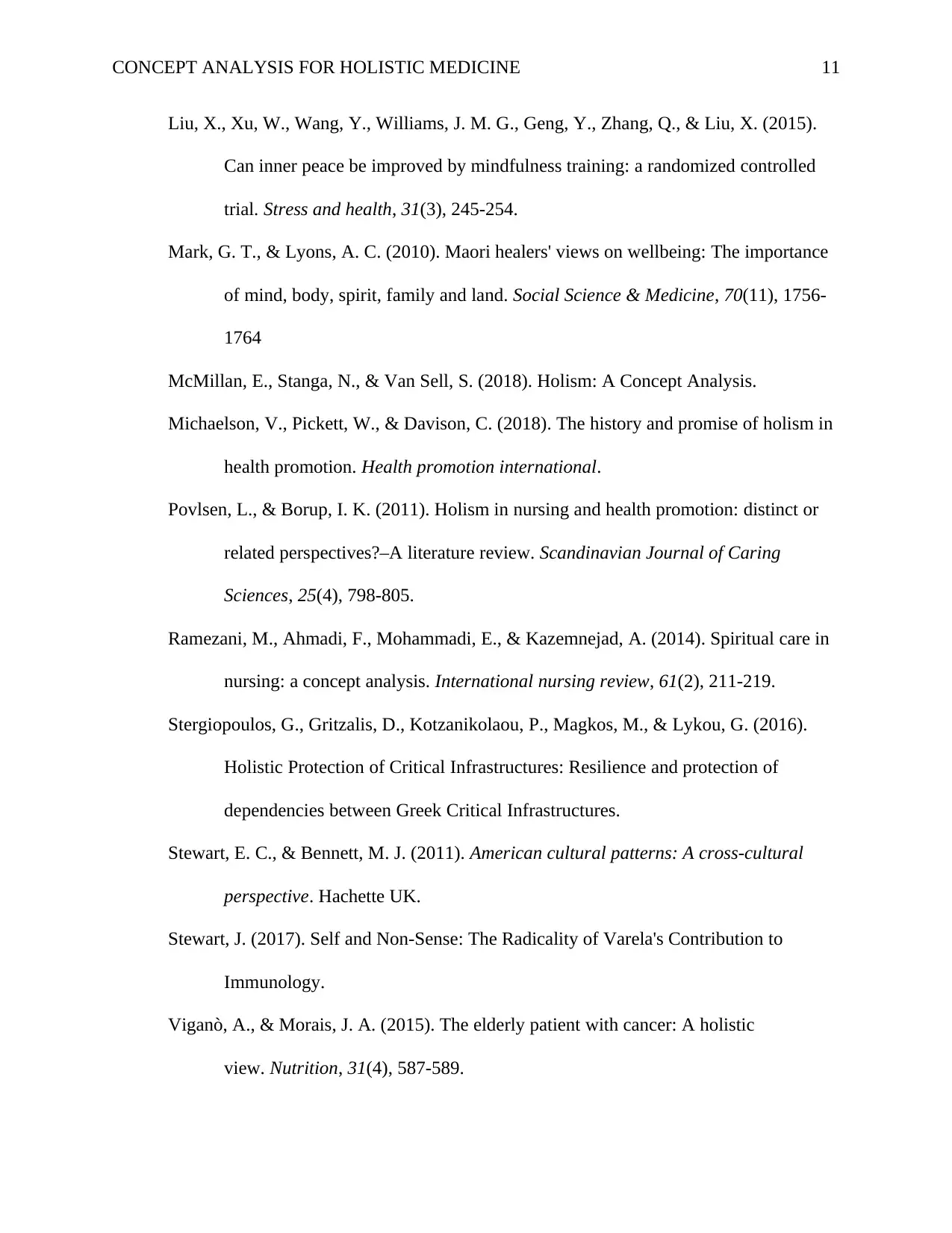
CONCEPT ANALYSIS FOR HOLISTIC MEDICINE 11
Liu, X., Xu, W., Wang, Y., Williams, J. M. G., Geng, Y., Zhang, Q., & Liu, X. (2015).
Can inner peace be improved by mindfulness training: a randomized controlled
trial. Stress and health, 31(3), 245-254.
Mark, G. T., & Lyons, A. C. (2010). Maori healers' views on wellbeing: The importance
of mind, body, spirit, family and land. Social Science & Medicine, 70(11), 1756-
1764
McMillan, E., Stanga, N., & Van Sell, S. (2018). Holism: A Concept Analysis.
Michaelson, V., Pickett, W., & Davison, C. (2018). The history and promise of holism in
health promotion. Health promotion international.
Povlsen, L., & Borup, I. K. (2011). Holism in nursing and health promotion: distinct or
related perspectives?–A literature review. Scandinavian Journal of Caring
Sciences, 25(4), 798-805.
Ramezani, M., Ahmadi, F., Mohammadi, E., & Kazemnejad, A. (2014). Spiritual care in
nursing: a concept analysis. International nursing review, 61(2), 211-219.
Stergiopoulos, G., Gritzalis, D., Kotzanikolaou, P., Magkos, M., & Lykou, G. (2016).
Holistic Protection of Critical Infrastructures: Resilience and protection of
dependencies between Greek Critical Infrastructures.
Stewart, E. C., & Bennett, M. J. (2011). American cultural patterns: A cross-cultural
perspective. Hachette UK.
Stewart, J. (2017). Self and Non-Sense: The Radicality of Varela's Contribution to
Immunology.
Viganò, A., & Morais, J. A. (2015). The elderly patient with cancer: A holistic
view. Nutrition, 31(4), 587-589.
Liu, X., Xu, W., Wang, Y., Williams, J. M. G., Geng, Y., Zhang, Q., & Liu, X. (2015).
Can inner peace be improved by mindfulness training: a randomized controlled
trial. Stress and health, 31(3), 245-254.
Mark, G. T., & Lyons, A. C. (2010). Maori healers' views on wellbeing: The importance
of mind, body, spirit, family and land. Social Science & Medicine, 70(11), 1756-
1764
McMillan, E., Stanga, N., & Van Sell, S. (2018). Holism: A Concept Analysis.
Michaelson, V., Pickett, W., & Davison, C. (2018). The history and promise of holism in
health promotion. Health promotion international.
Povlsen, L., & Borup, I. K. (2011). Holism in nursing and health promotion: distinct or
related perspectives?–A literature review. Scandinavian Journal of Caring
Sciences, 25(4), 798-805.
Ramezani, M., Ahmadi, F., Mohammadi, E., & Kazemnejad, A. (2014). Spiritual care in
nursing: a concept analysis. International nursing review, 61(2), 211-219.
Stergiopoulos, G., Gritzalis, D., Kotzanikolaou, P., Magkos, M., & Lykou, G. (2016).
Holistic Protection of Critical Infrastructures: Resilience and protection of
dependencies between Greek Critical Infrastructures.
Stewart, E. C., & Bennett, M. J. (2011). American cultural patterns: A cross-cultural
perspective. Hachette UK.
Stewart, J. (2017). Self and Non-Sense: The Radicality of Varela's Contribution to
Immunology.
Viganò, A., & Morais, J. A. (2015). The elderly patient with cancer: A holistic
view. Nutrition, 31(4), 587-589.
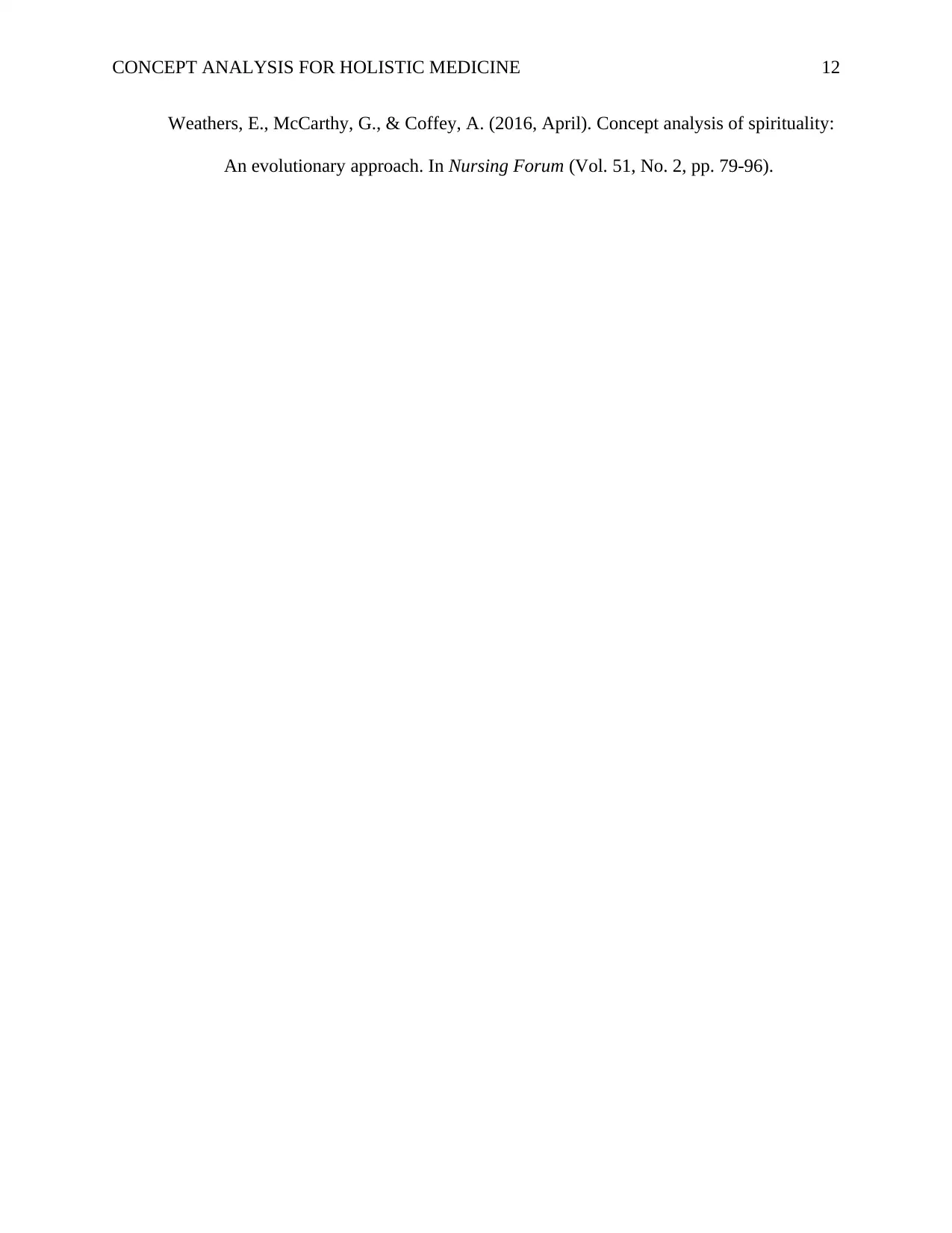
CONCEPT ANALYSIS FOR HOLISTIC MEDICINE 12
Weathers, E., McCarthy, G., & Coffey, A. (2016, April). Concept analysis of spirituality:
An evolutionary approach. In Nursing Forum (Vol. 51, No. 2, pp. 79-96).
Weathers, E., McCarthy, G., & Coffey, A. (2016, April). Concept analysis of spirituality:
An evolutionary approach. In Nursing Forum (Vol. 51, No. 2, pp. 79-96).
⊘ This is a preview!⊘
Do you want full access?
Subscribe today to unlock all pages.

Trusted by 1+ million students worldwide
1 out of 12
Related Documents
Your All-in-One AI-Powered Toolkit for Academic Success.
+13062052269
info@desklib.com
Available 24*7 on WhatsApp / Email
![[object Object]](/_next/static/media/star-bottom.7253800d.svg)
Unlock your academic potential
Copyright © 2020–2025 A2Z Services. All Rights Reserved. Developed and managed by ZUCOL.


